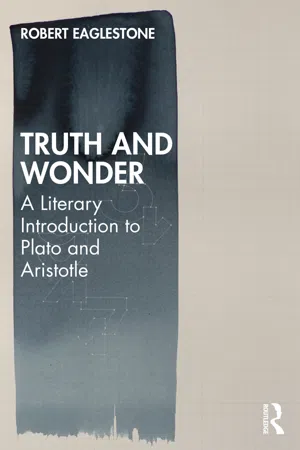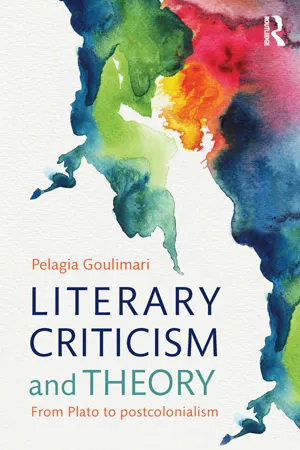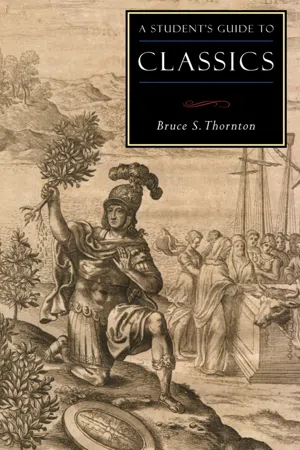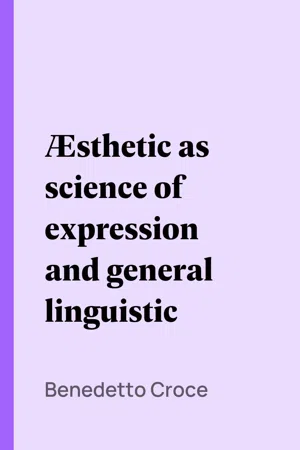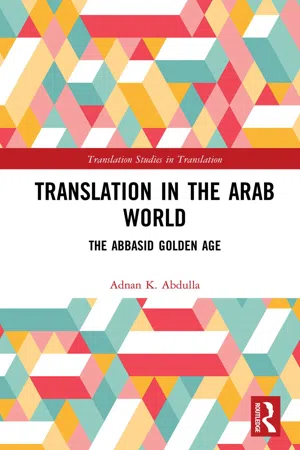Literature
Aristotle
Aristotle, a Greek philosopher and polymath, made significant contributions to literature through his work "Poetics." In this influential treatise, he outlined the key elements of drama, including plot, character, and spectacle, and provided insights into the nature of tragedy and epic poetry. His ideas have had a lasting impact on the study and creation of literature, shaping the way we understand storytelling and dramatic structure.
Written by Perlego with AI-assistance
7 Key excerpts on "Aristotle"
Learn about this page
Index pages curate the most relevant extracts from our library of academic textbooks. They’ve been created using an in-house natural language model (NLM), each adding context and meaning to key research topics.
- eBook - ePub
Truth and Wonder
A Literary Introduction to Plato and Aristotle
- Robert Eaglestone(Author)
- 2021(Publication Date)
- Routledge(Publisher)
Plato and Aristotle have extremely important and thought-provoking, if not always comfortable, things to say about poetry, drama and stories for an interested audience. Conveniently but perhaps unsurprisingly, navigating what they say about literature and how they say it turns out to be a speedy passage into the vaster oceans of their philosophy. Literary scholars often tell us that Plato is against literature, but why, and what is he for? Answering these questions tells us a great deal about Plato’s work. Similarly, while literary scholars often discuss the Poetics, usually in passing, they very rarely explore Aristotle’s wider thought and its more fundamental implications for how to live and for understanding literature. 8 Putting the central concerns of Aristotle’s thought and the Poetics together illuminates both. Plato and Aristotle still have much to teach us. Many thinkers and critics who have inspired our contemporary ways of understanding literature, our current criticism and theory draw a great deal from Plato and Aristotle, as debates about old words like representation (akin to what the classical Greeks called mimesis) or newer terms like logocentric suggest. As Miriam Leonard and Paul Allen Miller argue, we need to uncover these classical foundations more fully in order to understand the ideas of these more recent thinkers, and so our own responses, more clearly. 9 Some thinkers who perhaps ought to inspire our study of literature more (say, Hannah Arendt, Hans-Georg Gadamer) draw on this classical heritage too. Understanding how and why makes these thinkers and the complex questions they ask (and that they beg) more comprehensible. There are also missed encounters - eBook - ePub
Literary Criticism and Theory
From Plato to Postcolonialism
- Pelagia Goulimari(Author)
- 2014(Publication Date)
- Routledge(Publisher)
2 Aristotle and tragedy From Poetics to postcolonial tragedyDOI: 10.4324/9780203487198-3Aristotle, Horace, Sidney, Richardson, Johnson, Hegel, Shelley, George Eliot, Nietzsche, Bakhtin, Steiner, Williams, Soyinka, White, Nussbaum, Cixous, Eagleton, Quayson, ReissIn this chapter we will outline Aristotle’s literary theory, focusing on his Poetics and his understanding of tragedy. We will then trace Aristotle’s influence and sketch out the development of tragic theory and practice up to the present.Aristotle (384–322 BC) studied with Plato for many years. Unlike Plato, he was not an Athenian, though he lived, studied and taught in Athens for a large part of his life. Aristotle came from the kingdom of Macedonia, a region of the ancient Greek world that, in his lifetime, rose to succeed Athens and Sparta as the leader of that world, first with Philip II and then with Alexander the Great. Aristotle’s father was the royal physician to Alexander’s grandfather, while Aristotle himself was Alexander’s tutor. He benefited from this association until Alexander’s early death, though Alexander’s great favourite was the Iliad and its hero Achilles, rather than the works of his tutor.Aristotle’s early works, like Plato’s, were dialogues; unfortunately none of them have survived. His mature works are systematic expositions of their subject area aiming at comprehensiveness, that is, they are more like philosophical works as we tend to think of them than are Plato’s dialogues. Unlike Plato’s works, no one could mistake Aristotle’s works for literature or read them for aesthetic pleasure. At first glance, the difference between Plato and Aristotle is deceptively huge. One could say that Plato insists on the difference between philosophy and literature but writes philosophical works in a literary form; Aristotle argues for a rapprochement of philosophy and literature but doesn’t practice it. Unlike Plato, who is a visionary often starting from the ideal world of Forms as the realm of being and truth, Aristotle is more of an empiricist and a scientist tending to start from careful observation of the particular and the already existing and then moving up, classifying the particular into general categories, as part of a system. However, these are oversimplifications, as Plato’s method has both an “upward” and a “downward” path, and Aristotle follows him in this. - eBook - ePub
- Bruce S. Thornton(Author)
- 2014(Publication Date)
- Intercollegiate Studies Institute(Publisher)
LITERARY CRITICISMTHE WIDESPREAD ROLE of poetry in ancient public life ensured that thinking critically and systematically about the mechanics and purpose of poetry became an important intellectual activity. A long-lived critical concept that first appears in the work of Plato (c. 429–347 B.C. ) is that of imitation (“mimesis”), the idea that poetry creates imitations of situations and emotions. Plato thought this was a bad thing, for he believed that witnessing certain sorts of feelings created them in the viewer and made them more acceptable. Thus art, for Plato, has a moral and practical effect, helping to create the right and wrong sorts of people through what it imitates.The Poetics of Aristotle (384–322 B.C. ) established several ideas about literature and particularly theater that would later influence the Renaissance. We have already encountered his idea that tragedy’s imitation of events arouses “pity and fear” in the spectator and leads to the catharsis of these emotions. Thus, contrary to Plato, who distrusts the depiction of such emotions because they will inspire the real thing, Aristotle sees a therapeutic value in the arousal and vicarious discharge of these emotions. Other important ideas from the Poetics include that of harmatia, the tragic flaw or error that inflicts a reversal (“peripeteia”) of fortune on a basically good person, and Aristotle’s proposition that poetry is more philosophical than history, since the former is more universal and treats of things that could be rather than merely those things that are.Another Greek treatise of lasting influence is On the Sublime, which is attributed to Longinus (c. first century A.D. - eBook - ePub
Literary Criticism in Antiquity
A Sketch of Its Development: Greek
- J. W. H. Atkins(Author)
- 2021(Publication Date)
- Routledge(Publisher)
op. cit . p. 211.Nevertheless, in spite of shortcomings, the Poetics remains one of the greatest contributions to literary and critical theory, one of those rare books that have had lasting influence on the minds of men. With Aristotle came first the conception of theory as opposed to practice, of literary matter as opposed to literary form; and, after he had written, the way was prepared for a further analysis of art, free from prejudices of an ethical or political kind. Among the more important of his pronouncements is that in which poetry is defined as a concrete expression of the universal, and therefore representative of the highest truth; though equally significant is his challenge of the ethical view of poetry, his contention that the poet’s function is primarily to give pleasure. So that, from now on, there was no excuse for regarding poetry as a copy of reality or for confusing aesthetic with moral standards in judging art. Then, too, there is his theory of “imitation”, which in spite of later misunderstandings has the merit of making clear those relations of nature and art which undoubtedly exist in poetry; while, following Plato, he also emphasises the supreme importance of organic unity in all artistic work. In his treatment of tragedy he introduces us systematically to the logic of art, to the technique of dramatic structure, the theory of “probability” and the rest; and there is this further to be added, that while his doctrine of “catharsis” is something more than an ingenious piece of special pleading, his remarks on hamartia and peripeteia bring to light some of die most distinctive features of tragedy in its truest form. Elsewhere he calls attention to the place of the marvellous in poetry as affording a legitimate aesthetic delight, to the need for a certain distinction of language in poetic diction; and in numerous other places does he open up new trains of thought by means of casual hints which it was left for later ages to develop and complete. That his theorising lent itself at times to later misconstruction is also, of course, true; and the uncertain position he takes up with regard to metre is an illustration of this. There is also the doctrine of the “kinds” for which he was incidentally responsible. To him it was probably nothing more than a convenient classification of the practice of poets, whereas to later ages it came to denote a system of fixed “types”, with definite qualities and hard-and-fast rules, a theory which lay at the root of much of the later heresy. Then, too, it is significant that, although much of his work was concerned with formal questions, his definition of poetry was couched in terms of subject-matter, not form; and so for ages to come the essence of poetry was held to reside in the ideas conveyed, that is, in the inventio , an idea that was seemingly confirmed by the prevailing study of rhetoric. Nor were his methods altogether free from later misinterpretation. His Poetics - eBook - ePub
- Pierre Destrée, Malcolm Heath, Dana L. Munteanu, Pierre Destrée, Malcolm Heath, Dana L. Munteanu(Authors)
- 2020(Publication Date)
- Routledge(Publisher)
polis , and whose disintegration should be at the center of good tragic plots (Destrée), as well as the role of drama and other arts in the education and relaxation of the citizens which several essays touch upon.Ethics . The Poetics does not propose a moralistic function of poetry, which, at times, previous scholars have tried to impose on the treatise, desiring a forceful response to Plato’s critique of dramatic poetry. And yet, this does not mean that there are no ethical implications in Aristotle’s description of dramatic genres. We explore some possible connections between the Poetics and Aristotelian ethical treatises (Cinaglia, Munteanu) as well as discussing some moral caveats which performances of comedy and playing certain musical instruments carry for audiences in the Politics (Lockwood).Logic . The description of lexis in the Poetics can find fascinating correspondences not only in the Rhetoric , which has been noted, but also in Aristotle’s logical treatises. Heath’s final essay draws attention to R. McKirahan’s pioneering article (Apeiron 43: 2010) on this subject. More in depth, Cirillo’s essay links the Poetics to Aristotle’s Categories to illuminate the use of metaphor in poetic genres. While our volume addresses the subject only in brief, we recognize this to be a promising area of research, worthy of future development.Engagement with predecessors and with broader cultural matters . Aristotle’s methods of thinking typically presuppose engaging with previous thinkers and with broader cultural matters. Fossheim’s and Trivigno’s essays illustrate well this aspect of contextualization, showing how Aristotle’s response to Platonic views often reframes the subject of discussion in a completely original manner. How, for Aristotle, philosophy, poetry, and history share in “the universal” becomes clear only if we connect the brief statement in the Poetics - Benedetto Croce(Author)
- 2017(Publication Date)
- Perlego(Publisher)
[4]In the Middle Ages and Renaissance.After Aristotle, the theory of poetic kinds does not seem to have been completely or elaborately developed in antiquity. The Middle Ages may be said to have expressed the doctrine in treatises of the kind known as "rhythmic arts" or "methods of composition." When the Aristotelian fragment was first noticed, it is curious to see the way in which the paraphrase of Averroes distorted the theory of kinds. Averroes conceives tragedy as the art of praise, comedy as that of blame, which amounts to identifying the former with panegyric, the latter with satire; and he believes the peripeteia to be the same thing as antithesis, or the artifice of beginning the description of a thing by describing its opposite.[5] This distortion demonstrates afresh the merely historical character of these kinds and their unintelligibility by the methods of pure logic to a thinker living in times and under customs different from those of the Hellenic world. The Renaissance seized upon Aristotle's text, partly expounded it, partly distorted it and partly thought it out afresh, and thus succeeded in establishing a long list of kinds and sub-kinds rigidly defined and subjected to inexorable laws. Controversy now began over the correct understanding of the unities of epic or dramatic poetry; over the moral quality and social standing proper to the characters in this kind of poem and in that; over the nature of the plot, and whether it includes passions and thoughts, and whether lyrics should or should not be received as true poetry; whether the material of tragedy should be historical; whether the dialogue of comedy may be in prose; whether a happy ending may be allowed in tragedy; whether the tragic character may be a perfect gentleman; what kind and number of episodes is admissible in the poem, and how they should be incorporated in the main plot; and so on. Great anguish was caused by the mysterious rule of catharsis found in black and white in Aristotle's text, and Segni naïvely predicted that tragic poetry would be revived in its perfect spectacular entirety for the sake of experiencing the effect spoken of by Aristotle, that "purgation" which causes "the birth of tranquillity in the soul and of freedom of all perturbation."[6]- eBook - ePub
Translation in the Arab World
The Abbasid Golden Age
- Adnan K. Abdulla(Author)
- 2020(Publication Date)
- Routledge(Publisher)
In other words, Aristotle’s famous definition of tragedy emphasizes the fact that tragedy imitates a noble action that has a beginning, middle, and end. It should be written in lofty language, and must be acted out on stage, not narrated. All these factors should lead the spectator to identify with the hero, who suffers in tragedy because of an inherent flaw (hamartia). The spectator feels safe in his/her seat of the theater while also experiencing fear for what might happen to them and pity for the hero who is crushed at the end by forces he cannot fathom. The interaction of the two emotions lead to what Aristotle calls katharsis – a concept that has puzzled critics since Averroes’s abridgement of Aristotle’s Poetics was introduced to Europe in 1256 in a Latin version by Hermannus Alemannus (“relying on the assistance of the ‘Saracens’ residing at that time in Toledo”) (Gould 2014: 1). Katharsis or catharsis is translated as “purgation,” “purification” or “clarification,” depending on the meaning the translator thinks is most suitable (Abdulla 1985). None of the Abbasid translators and commentators capture Aristotle’s ideas about tragedy; they do not understand the difference between what is acted on stage and what is narrated, and this leads to other pitfalls. Since Greek drama is an unknown genre for the Abbasids, neither domestication nor foreignization worked in introducing it to the Arab audience. It remained a mysterious notion for more than a thousand years. Nothing worked in assimilating Aristotle’s Poetics to a culture that did not have a theater. Finally, we move in time and place to a different type of philosopher who lived in Andalusia in the twelfth century. He is Averroes (d. 1198 CE), known in Arabic as ibn Rushd, who was a renowned Aristotelian scholar, astronomer, physician, and philosopher
